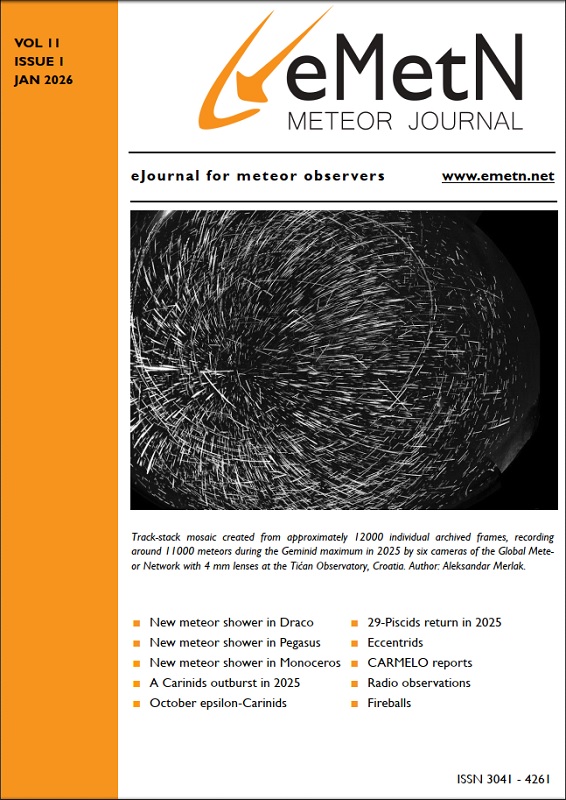Abstract: A list with proposed meteor shower names is presented, vetted and modified so as to be unique for the pending future naming decisions of newly discovered meteor showers since 2022.
Introduction
A list of meteor shower names is maintained by the IAU Meteor Data Center at https://www.ta3.sk/IAUC22DB/MDC2022/
Since July of 2022, the Meteor Data Center (MDC) no longer assigns names to meteor showers, instead postponing the naming until a shower is established. In the past three years, no shower received a name, despite the fact that most new showers are well observed. These showers have quickly faded from memory.
Here, all previously proposed names are summarized in one table, updated with possible names for showers for which no name has yet been proposed. All are informal proposals made independent from the MDC staff.
Proposed names
Sometimes, observers have proposed names upon discovery or during predictive modeling, but that information is hard to find. More often, the shower is introduced merely in terms of 19th century descriptions like “The shower with a radiant in Cetus”.
The MDC does not maintain a list of proposed names. The proposed names are not always suitable. The naming rules were relaxed, but to keep the literature transparent, the proposed names still need to be vetted so that they are unique compared to other showers already in the literature. That can, for example, require adding the month of activity to the name.
Below is a tally of proposed names, vetted and modified so as to be unique, as well as corresponding provisional unique codes and numbers (Table 1).
The IAU has the final word on these assignments. Pending those future naming decisions, this list may serve the purpose of helping with assigning names, codes and numbers, to cross correlate the current literature, and to keep these showers in memory.
Table 1: Provisional names of recent meteor showers.
Design. | Name | Code | Number | Sol | R.A. | Dec. | Vg |
(deg.) (deg.) (deg.) (km/s)
-------------------------------------------------------------------
M2022-Q2 Feb. omic.-Andromedids FMA 1212 113.7 342.4 +44.0 53.3
M2023-D1 Jan. alpha-Bootids JAB 1213 282.66 218.8 +28.2 58.9
M2023_D2 theta-Draconids TDR 1214 296.3 235.2 +60.7 32.8
M2023-F1 Aug. nu-Ursae-Majorids ANU 1215 239.24 155.8 +59.7 55.0
M2023-F2 chi-Delphinids CHD 1216 67.30 311.8 +9.1 63.3
M2023-F3 xi-Serpentids XIS 1217 22.11 266.3 -15.9 65.9
M2023-F4 Sep. beta-Ursae-Major. SBU 1218 277.01 164.3 +54.0 48.0
M2023-F5 delta-Leonids DEO 1219 265.10 164.3 +20.5 68.0
M2023-K1 51-Sagittids FSG 1220 54.54 300.3 +17.8 59.7
M2023-O1 nu-Herculids NUH 1221 25.8 270.5 +30.7 48.9
M2023-V1 lambda-Sculptorids LSC 1222 160.0 7.1 -38.8 10.0
M2024-H1 iota-Herculids IHE 1223 37.8 261.1 +47.3 35.6
M2024-N1 psi-Fornacids PFO 1224 102.88 44.26 -38.21 51.6
M2024-P1 nu-Capricornids NUC 1225 139.05 306.65 -11.38 18.3
M2024-S1 zeta-Ursae-Minorids ZUM 1226 181.90 238.27 +77.26 32.0
M2024-U1 theta-Lyrids THL 1227 213.55 288.87 +37.01 13.1
M2024-Y1 Sept. psi-Cassiopeiids SPC 1228 162.10 20.6 +73.5 46.4
M2025-B1 theta-Pegasids TAP 1229 217.7 336.6 +9.1 11.0
M2025-F1 March zeta-Puppids MZP 1230 359.0 121.9 -37.2 15.1
M2025-K1 xi-Octantids XOC 1231 62.3 349.1 -79.8 40.6
M2025-L1 (tau-Herculids) TAH 1232 69.5 197.0 +51.5 12.1
M2025-L2 (tau-Herculids) TAH 1233 71.5 203.1 +7.5 11.7
M2025-O1 delta-Equuleids DQU 1234 92.2 319.4 +9.2 56.9
M2025-O2 delta-Tucanids DTU 1235 85.2 330.0 -63.8 43.8
M2025-P1 July upsilon-Cetids JUC 1236 125.6 29.5 -21.1 61.4
M2025-Q1 August Arietids AAR 1237 153.5 47.5 +11.5 68.3
M2025-S1 September Delphinids SDE 1238 172.9 308.8 +9.7 12.5
M2025-S2 Horologiids HOR 1239 175.3 31.6 -66.9 20.6
M2025-U1 October gamma-Piscids OGP 1240 209.6 359.1 +11.4 14.3
M2025-V1 Oct. epsilon-Monocero. OEM 676 220.1 99.5 +7.0 62.3
-------------------------------------------------------------------
The shower added most recently is already in the literature by being listed in the book “Atlas of Earth’s Meteor Showers”. Eight showers were identified late in the writing of this book and given the designations listed in Table 2.
Table 2. Provisional names of meteor showers already documented in the recent literature.
Design. | Name | Code | Number | Sol | R.A. | Dec. | Vg |
(deg.) (deg.) (deg.) (km/s)
----------------------------------------------------------------
M2023-U1 October 44-Hydrids FHD 674 199.2 153.6 -22.9 47.7
M2023-U2 Oct. epsilon Monocer. OEM 676 215.8 96.2 +6.8 63.1
M2023-U3 Sept. zeta-Puppids SZP 678 175.2 114.8 -39.9 41.6
M2023-U4 r-Pupppids RPP 682 156.7 122.8 -33.5 36.8
M2023-U5 March eps.-Pegasids MEP 690 4.9 324.0 +6.1 50.0
M2023-U6 April beta-Aquariids BEA 697 21.5 267.5 -16.3 65.9
M2023-U7 omega-Herculids OHE 699 26.3 248.4 +17.2 46.5
M2023-U8 eta-Arids EAR 700 33.7 256.4 -60.1 52.0
----------------------------------------------------------------
References
Jenniskens P. (2023). Atlas of Earth’s Meteor Showers, Amsterdam: Elsevier, 824 pp.


